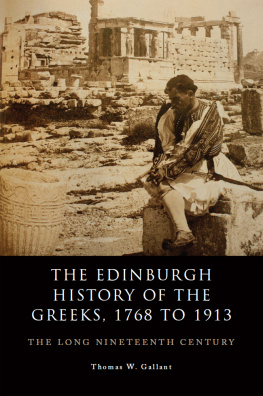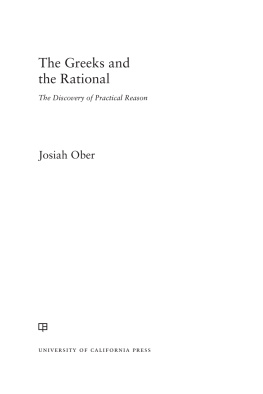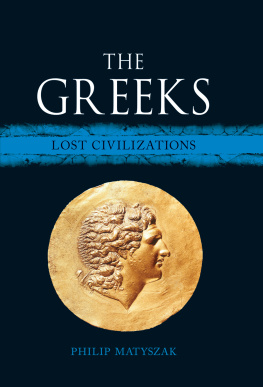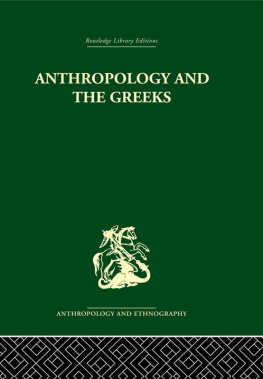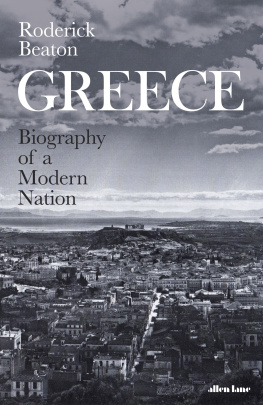The Edinburgh History of the Greeks, 1768 to 1913
The Edinburgh History of the Greeks
Series Editor: Thomas W. Gallant
Titles available
The Edinburgh History of the Greeks, c. 500 to 1050: The Early Middle Ages
Florin Curta
The Edinburgh History of the Greeks, 1786 to 1913: The Long Nineteenth Century
Thomas W. Gallant
Forthcoming titles
The Edinburgh History of the Greeks, 323 to 30 BC: The Hellenistic World
Joseph G. Manning
The Edinburgh History of the Greeks, 1453 to 1785: The Ottoman Empire
Molly Greene
The Edinburgh History of
the Greeks, 1768 to 1913
The Long Nineteenth Century
Thomas W. Gallant
EDINBURGH
University Press
To Dad
Thomas W. Gallant, 2015
Edinburgh University Press Ltd
The Tun Holyrood Road,
12(2f) Jacksons Entry,
Edinburgh EH8 8PJ
www.euppublishing.com
Typeset in 11/13pt Sabon
by Norman Tilley Graphics Ltd, Northampton and printed and bound in Great Britain by CPI Group (UK) Ltd, Croydon CR0 4YY
A CIP record for this book is available from the British Library
ISBN 978 0 7486 3605 1 (hardback)
ISBN 978 0 7486 3199 5 (webready PDF)
ISBN 978 0 7486 3606 8 (paperback)
ISBN 978 0 7486 3607 5 (epub)
The right of Thomas W. Gallant to be identified as Author of this work has been asserted in accordance with the Copyright, Designs and Patents Act 1988, and the Copyright and Related Rights Regulations 2003
(SI No. 2498).
Contents
Illustrations and Maps
Illustrations
Maps
Tables
Acknowledgements
This volume in the Edinburgh History of the Greeks covers the crucial period when they went from being a stateless nation embedded in a pre-Modern, multinational empire to a people divided among their own nation-state, Greece, the Ottoman Empire and a rapidly globalising diaspora. This is a big story that must be told on a grand scale. Because of the scope of the book and the multiple historiographies that it engages, it has been a long time in preparation.
Over years that I have been working on it, I have accumulated many intellectual and practical debts. First, I want to express my deepest thanks to Carol MacDonald and her colleagues at Edinburgh University Press. They have been extraordinarily generous in helping me at every turn. The book has benefited from the many discussions that I have had over the years with my fellow Greek historians, among whom I want to single out Antonis Liakos, Doxis Doxiades, Sakis Gekas and Emilia Salvanou. While working on the book, my thinking about Greek history and the need to contextualise it in multiple historiographies has been shaped by collaborating with some of the brightest young minds in the field today. I have learned as much from working with the doctoral students in UC San Diegos doctoral program in Modern Greek History as they have learned from me. In terms of the hard work of writing, Sadie, Sabrina and Marley were my constant sources of inspiration and most of the book was written in their company. The one person without whom this book could never have been written is my wife, partner and lifelong friend, Mary P. Gallant. Her contributions are so many that they defy enumeration. Words cannot convey my deepest appreciation for all that she does. Lastly, this book is dedicated to my father, Robert A. Gallant. He has always been an inspiration to me and I owe him an eternal debt of gratitude for being the best father that a son could ever have.
Series Editors Preface
The Edinburgh History of the Greeks is a multi-volume, chronological series covering the history of the Greek people from Antiquity to the present. Each volume combines political history with social and cultural history in order to tell the story of the Greek people over the course of recorded history in an exciting, novel and innovatory way. Drawing on resources from anthropology, archaeology and history, as well as political science, philology, art, literature and law, the books will be rich in diverse in their coverage.
The Greeks suffer from too much history, some have said. Indeed, library bookshelves sag under the weight of the massive number of tomes devoted to the history of Greece during ancient, medieval and modern periods. This series differs from them by focusing on the history of a people, the Greeks, and not a place, Greece. The story will reflect the fluctuating dynamics of change while primary sources and accounts of the lives of individuals and communities will give life to the text.
The history of the Greeks over the long dure must be told on a vast and at times even global scale, and so the Greek world is not just taken to include the area traditionally associated with ancient Greece or the territory of the modern Greek state, but encompasses all areas where Greeks have settled, including the diaspora of modern times.
Thomas W. Gallant

.
CHAPTER 1

The winds of change
The early morning night sky lit up in a stunning burst of bright orange as the main mast of the Real Mustafa, the Ottoman flagship and the empires largest ship-of-the line, exploded, raining fiery embers onto its sails (). Soon the ship was engulfed in flames. Over the next few hours almost the entire Ottoman fleet would be destroyed in the narrows of esme under a constant barrage of cannon fire from the Russian fleet. Of the seventy-three Ottoman ships that had entered esme Bay, located in the straits between the island of Chios and the coast of Anatolia, fewer than a dozen made it out intact. While the fleet was smouldering in esme Bay, elsewhere in the empire another disaster was unfolding. A joint Ottoman-Tatar army confronted a Russian force on the banks of the Larga River, a tributary of the Prut River. At a place called Varlea the Ottoman commander Abdi Paa and the Crimean Khan Kaplan Giray arrayed their massive army. Outnumbering the Russian forces led by General Peter Rumiantsev by almost three to one and with a seven-to-one superiority in cavalry, victory seemed assured. Instead the battle turned into a rout. The deployment of the Russian forces in regimental squares nullified the Ottoman-Tatar cavalry and repeated bayonet charges broke the Ottoman infantry lines. While not the worst defeat on land that the Ottomans would suffer in the 176874 Russo-Ottoman War, it set the pattern for the remainder of the conflict. With the destruction of its fleet and the defeat of its army on the Danubian frontier, 7 July 1770 has to go down as one of the worst days in the long history of the Ottoman Empire.
The 176874 Russo-Ottoman War marks a critical turning point in world history. For many historians, it inaugurated an issue that would impact European Great Power relations for the next 120 years: the Eastern Question. Of more practical and immediate importance were the numerous and significant developments that occurred as result of the war and the treaty that ended it. And so, because it was the event that started the long nineteenth century in Southeastern Europe and the Eastern Mediterranean, we need to begin with an examination of this fateful conflict.


